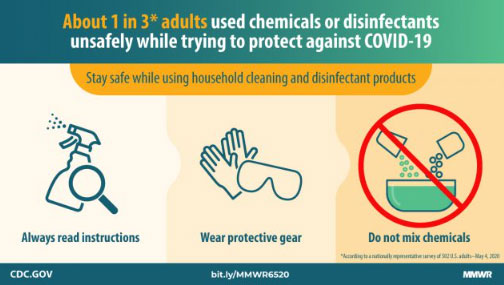COVID-19 Poison Prevention Education
How is the TN Poison Center handling COVID-19 related poisonings?
There has been a 20% increase in calls that involve hand sanitizer, bleach, and miscellaneous/all-purpose cleaners to the Poison Help hotline (1-800-222-1222) from January-March 2020 compared to the same time period during the previous year- January- March 2019. The surge in hotline calls due to COVID-19 related poisonings are happening at Poison Centers nationwide. The TPC is working diligently to provide poison specialists with up-to-date poison information to assist in case by case evaluation and guidance of COVID-19 related poisonings. Also, the TPC is conducting state-wide poison prevention education and outreach for safe use and storage of cleaners and disinfectants.
The most common items involved in COVID-19 related poisonings are explained below. However, the same caution should be taken when handling other types of potentially toxic products. A poison emergency can happen if a product or substance is ingested, inhaled, injected, or exposed to the eyes or skin. It can be harmful if it is used in the wrong way, by the wrong person or in the wrong amount.
How to properly use household chemicals to prevent a poison emergency?
Now that the public is home more, have purchased more cleaning products to prevent the spread of COVID-19 and consuming medications to treat the virus, the risk of accidental poisoning have increased. With new daily routines and a plethora of misinformation in the media, accidents can happen.
These harsh chemicals are not for the skin or body and cause lead to irritation or a serious outcome if ingested. These products are meant for hard surfaces including kitchen countertops and appliances, bathroom fixtures, floors, and phones. When handling chemicals to clean or disinfect it is crucial to follow these tips to prevent a poison emergency:
Safe Handling
- Always wear protective gloves when handling chemicals to clean or disinfect.
- Always read and follow the instructions on the label.
- Never mix chemicals as it could create a toxic gas and lead to a poison emergency or a serious outcome.
- Never eat, drink, inhale or inject cleaners or disinfectants into your body or apply to the skin as it can cause serious damage.
- Do not use cleaning products on food. Wash or rinse with water.
Safe Storage
- Always store chemicals and other potentially toxic products in a locked cabinet and out of the reach of children.
- Store cleaners, chemicals, medicines and other potentially toxic products in their original containers.
- Always keep original label on products or accurately labeled.
- Label potentially toxic products with a poison control sticker to make it more identifiable.
Hand Sanitizers
Hand sanitizers contain a high alcohol content and is more potent than beer, wine and most hard liquors. Improper use can lead to alcohol poisoning, especially in children due to their size.
Tips when handling hand sanitizer:
- Always supervise children when using hand sanitizer.
- Only use a dime size amount and rub hands together until dry.
- Safely store hand sanitizer up and out of reach when not in use.
- Teach children to “Ask First”.
Medicines
Always check with your doctor before taking any new medication or supplements, especially those that are advised through media outlets.
One pill can kill if taken by the wrong person, in the wrong amount, or combined with other medicines. Practicing safe medication use will prevent a poison emergency.
Tips on safe handling of medicines
- Use a medication checklist for daily medicines, especially for the older adults.
- Use a pill organizer to ensure medicines are not mixed and taken at the correct time.
- Always keep medicines in original bottle.
- Never leave medicines on the counter or night stands, and keep purse or bag containing medicines stored up and away from children.
- Lock medicines in a cabinet, medication lock box or store up and away, out of reach of children.
- Always follow the instructions listed on the label, even if you are familiar with the brand.
- Double check the name on the prescription as mix ups can happen if a child is named after a parent.
- Never share prescribed medication with anyone.
If you are unsure what is safe, have questions or suspect a poisoning, do not wait for symptoms, call the Poison Help hotline at 1-800-222-1222 immediately. The hotline is toll-free and available in more than 150 languages.
How can I request poison prevention literature and materials?
To request literature and materials, please fill out the literature request form or contact the Administrative Office at 615-936-0760. Please leave a voicemail with your name and contact number and the Coordinator of Community Outreach, Sophie Raffo, will contact you to fulfill your request. There is no cost and items are shipped free of charge.
Additional Resources
The Centers for Disease Control and Prevention website has additional tips on how to properly clean and disinfect your home and other surfaces. Click here to read.
For COVID-19 related poison data, click here to visit the American Association of Poison Control Centers. Data highlights exposures by product, age, gender, and medical outcome.
